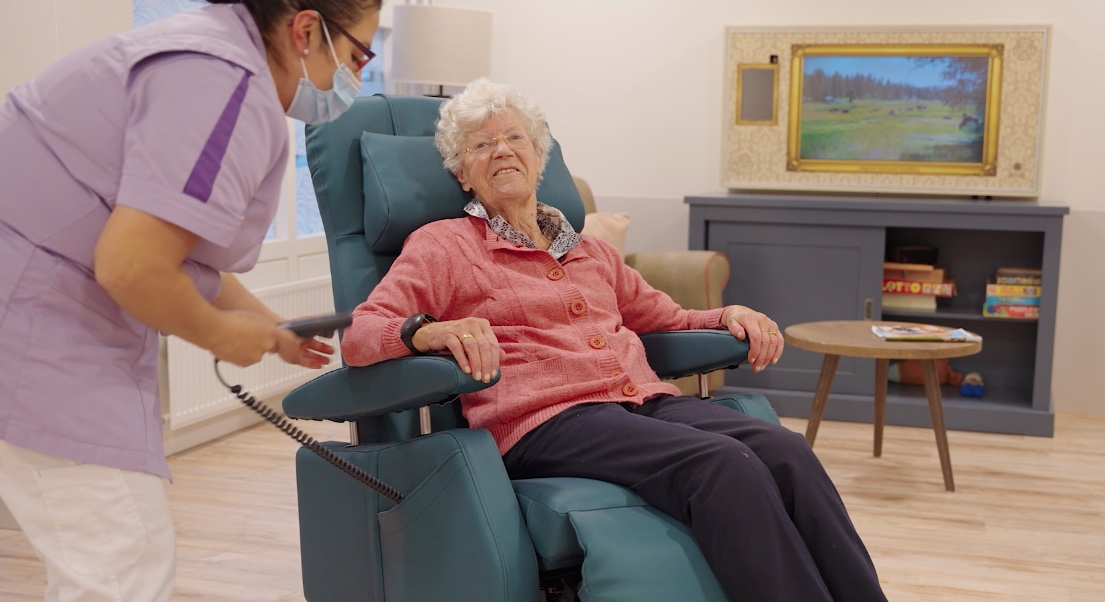 | The story of Maria and LouiseMaria Montenegro (care assistant) and Louise den Ouden (welfare worker) were involved in a pilot project in a unit at Floravita. This is a care home based in Boskoop (NL). Louise and Maria explain how one resident with agitated behaviour has a disruptive effect on the well-being of fellow residents. Both have experienced the ZEN Care Chair helping this agitated resident to relax more easily. The chair reduces restlessness, which has a direct effect on the mood in the rest of the group. They also mention other positive effects. Louise enjoyed seeing how a new world opened up for one female resident with a deformed back, simply by changing the tilt position of the ZEN Care Chair. Maria reports that the chair has now become essential. |
The story of Tom and BodineBodine Schers (nurse) and Tom Kerkhoffs (occupational therapist) tell us about their experiences with the ZEN Care Chair. They took part in a pilot project in Helden (NL), in a care home complex with five small-scale dwellings for persons with dementia, part of De Zorggroep. Giving various examples, Tom explains how the ZEN Care Chair can have an impact on residents who become restless following over- or under-stimulation. He also tells us how to get the best out of the care chair for individuals. Bodine relates the story of a resident who has a persistent urge to wander and who also suffers from moments of aggression. The man in question was not able to get adequate rest, which only exacerbated the problem. By using the ZEN Care Chair he succeeded in getting more rest and comfort. |  |
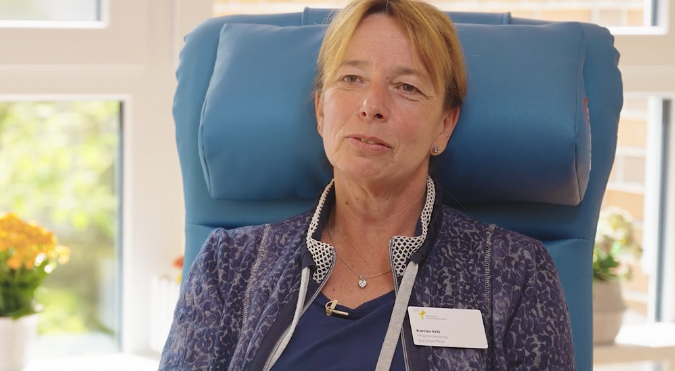 | The story of Karina and Ina
In Germany too, they have had a lot of experience with the ZEN Care Chair. Residenz am Wiesenkamp in Hamburg houses a number of residents who need a lot of care. Karina Arlt (head of the nursing unit) and Ina Sarkander (occupational therapist) explain how the ZEN Care Chair is used and what the positive effects of it are. Watch the video! |
The story of Golden YearsJennifer Veldhuizen is a nurse at Golden Years, location Eikenrode in Loosdrecht. The residence has 18 residents. A large number of them have some form of dementia or Parkinson's disease. After a successful trial placement, Golden Years purchased a ZEN Care chair. Everyone is extremely happy with it, says Jennifer. Not only the residents, who experience more peace and relaxation, but certainly also the staff. In a time of staff shortages, the ZEN Care Chair is an effective means of keeping the workload under control. This comes through clearly in her story: 'Without a chair, it takes much longer to remove restlessness'. To do so, click on 'Read more'.
‘Without a chair, it takes much longer to remove anxiety'Nurse Jennifer Veldhuizen on the effect of the ZEN Care Chair "For many of our residents, it is important that they can take a nap in the afternoon. They need it because otherwise they may suffer from a restless mood. Or fellow residents may suffer from that mood. At the same time, many people prefer not to go to their bedrooms at such times. They don't like that, feel anxious when they are on their own, for example. So putting a resident to bed during the day is not always easy and sometimes takes up a lot of time. The ZEN Care chair with rocking function is therefore an ideal aid. People can simply stay in the living room and take a nap there. Instead of putting someone to bed, we can do other things - for example with fellow residents - while still keeping an eye on the person sleeping.” Fewer staff? Using ZEN Care chair makes a big difference "We have noticed that rocking makes someone calm down and fall asleep more easily. This works very well, including with some residents who suffer from psychosis. If we see that a psychotic attack is imminent, we accompany the lady in question to the chair and switch on the rocking function. She often falls asleep quickly and after that nap, the attack blows over. Of course, this is especially nice for the resident herself, but also for us as caregivers. If an agitated person would not be able to use the ZEN Care Chair, you would spend quite a while trying to take away the restlessness. It varies from person to person, but it can take up to an hour or an hour and a half at most. In such a situation, a resident needs one-on-one attention. You cannot give that time to someone else. Colleagues have to accommodate this, which really burdens them because we too face staff shortages. So when a resident calms down in the chair, that makes a big difference." More job satisfaction "The ZEN Care Chair is the first innovative tool that works really well for us. I speak for all my colleagues when I say that everyone is happy with it. The residents like the fact that they can close their eyes while rocking in the chair and still remain part of the group. The staff experience more job satisfaction, which is also important. In short: a very nice tool!"
|  |
The story of WarandeOccupational therapist Laura van der Gun works at Warande, at the Heerewegen location in Zeist. At the nursing home, her work includes increasing comfort around a person's sitting and lying posture. She informs caregivers about this and teaches them certain skills. Sometimes it is also about the way to approach a resident, or bringing back some independence. When Laura read about the ZEN Care Chair in a newsletter, she was initially skeptical. By thinking 'what's not done is always done wrong', she decided to request a trial placement anyway. Could this perhaps give the resident with a very strong urge to walk more peace of mind? In the story 'The trial placement convinced me', you can read about Laura's experience and how it continued.
'The trial placement convinced me' Talking to occupational therapist Laura van der Gun about experiences with the ZEN Care Chair. Why do people with dementia sometimes walk so restlessly? "With dementia, certain behavior can always have several causes. The trick is to find out what that cause is and how to fix something. One of the possible causes of strong urges to walk is under-stimulation of the balance organ. I learnt this during a course on sensory information processing among the elderly. When there is under-stimulation, a person experiences too few balance stimuli. In this situation, 'more movement' is the function of walking and the ZEN Care Chair is a possible solution." How did you come across the ZEN Care Chair? "A resident at the Heerewegen location had very strong urges to walk. She couldn't find rest anywhere. I wasn't sure what to do. In a newsletter from our medical and technical aid supplier, I read about the ZEN Care Chair. To be honest, I was very skeptical; another new thing on the market... On the other hand: nothing ventured, nothing gained, so I wanted to try it out anyway. That was arranged through someone from the medical and technical aid supplier, who also explained how the chair works with the rocking motion." How did your first experience go? "We put the chair on the ward and the resident fell asleep immediately when she rocked in it. Everyone was amazed: she is really at peace now! For me, this was proof that it works. The trial placement convinced me. It also helped the care staff. Because they saw that the resident was more calm, they did not have to take action every time to try to get her to sit somewhere. I understand that reducing the restlessness additionally caused the resident to sleep better." What happened next? "Warande purchased the ZEN Care Chair and it is now on the ward. The activity supervisor in particular is keen to try it out on different people. I also hear back that more and more residents are taking the initiative to sit in it themselves. Someone then asks: 'I want to sit in the green chair for a while'. This allows the resident to independently take a moment of rest. The manual operation of the chair is so simple that many people are quite capable of using it themselves." What do care workers think of the ZEN Care Chair now? "That is quite a special story. It took quite a lot of effort to get the finances for this chair, although in my view it is not that expensive at all. Eventually it worked out and the chair was purchased with the intention of using it on several wards. Which is fine, as it is easily movable. But the staff in the department where it is located don't want do without it anymore. They think a second chair should be bought for other departments. Fortunately, I notice that our organization is now more open to this. I think the ZEN Care Chair will spread through our organization and many departments will purchase one." Do you have any advice for colleagues? "What I have found is that your own experiences with chair are irrelevant. I am someone who quickly gets sick of rocking; standing on a boat, for example, is not for me at all. So when I sat in the ZEN chair, I didn't like that rocking. Residents turned out to react very differently; they did like it. So don't test it on yourself, but on your residents."
| 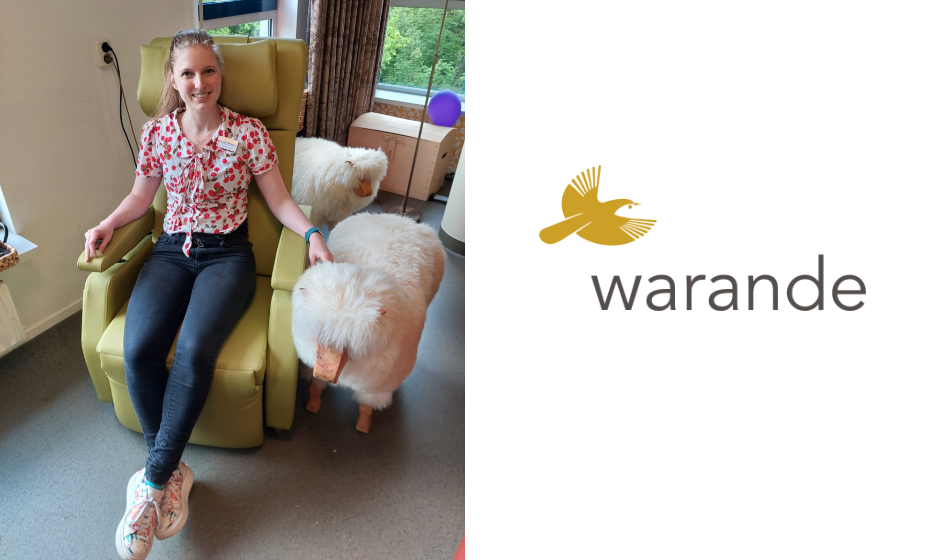 |
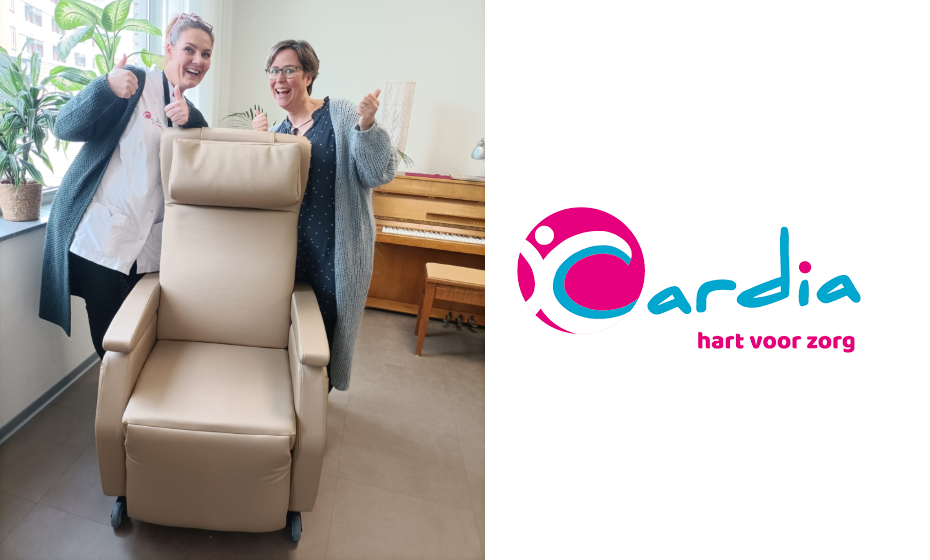 | The story of CardiaOccupational therapist Anke Korf works in Cardia's Floriadehof nursing home, among other places. People with dementia live here. Looking for ways to offer a very stressed resident more peace and quiet during the day, she came across the ZEN Care Chair. A trial placement was arranged, after which two trainee carers started using the chair regularly. The results were remarkable: she was now able to relax. Cardia purchased the ZEN Care chair. The aid is now being used with several residents, something Anke welcomes. As an occupational therapist, she sees many opportunities to enhance the well-being of residents. In the story 'The ZEN Care chair is a hit', several cases are explained.
'The ZEN Care Chair is a hit'In conversation with occupational therapist Anke Korf on experiences with the ZEN Care Chair.
How did you come across the ZEN Care Chair? "I work at Cardia locations in Zoetermeer and Scheveningen. Both nursing homes are home to people with dementia. Floriadehof in Zoetermeer is home to a lady who is very tense. This manifests itself in high muscle tension and a lot of shouting. She sleeps a lot, but not in a relaxed way. All kinds of things have been tried to help her relax more; among others, an Innocare lying system for in bed, but we wanted something for during the day as well. We thought about a standard manual rocking chair, but our supplier of medical and technical aids advised against this and recommended trying the ZEN Care Chair. The chair then came on trial." Did this have any results? "Two trainee carers, Suzanne van der Zwan and Jessica Jongmans, suggested making it a study project. They kept observation lists and also made a video. The ZEN chair turned out to be a hit. When I saw the video, tears almost came to my eyes. In the chair, this lady became a lot more alert and clearer, she relaxed and started laughing. You could literally see her enjoying the rocking sensation. Like she was lounging in a hammock on the beach." As an occupational therapist, what explanation do you have for this? "In my view, this can be traced back to sensory stimulus processing. Even in childhood, rocking has positive effects. Children love rocking, they find it a nice sensation. In the ZEN Care Chair, rocking goes slowly like in a cradle. If someone is then lying comfortably, under a warm blanket, it gives an extra sense of security." How did the caregivers react? "They were so enthusiastic that they wanted to try it with other people too. There was a lady with a lot of urge to move and claim behavior and the rocking proved to work with her too. This lady calmed down, just stayed seated and sometimes fell asleep. When the rocking stopped, she became restless again. The caregivers found it so special to see that difference." Did this also affect fellow residents? "Definitely. When this lady was restless, it was intense for the whole ward. It led to irritation and sometimes even arguments among other residents. Once in the ZEN chair, the woman's restlessness disappeared and it had an immediate effect. The ward was quieter and relaxed, even if sometimes only for half an hour or an hour. Then the staff could play games with other residents or read the newspaper with someone. See, the only other way to offer this lady peace and quiet - she has since passed away - was by taking her for a walk. You understand that there is not always time for that. That's why it's so nice that the chair is there." What happened after the trial period? "The ZEN Care Chair was purchased for Floriadehof with money from the innovation budget. We try to use it for anyone we think might benefit from it. For example, I saw a lady who sits forward a lot, with her nose almost on her knees. She experiences a lot of stimuli in the mouth area, has difficulty keeping food down and often has to vomit. I advised the carers to try out the ZEN chair on her too. This again produced great results. Rocking in the tilted chair allowed her to sit upright again, explore the world and the spitting up decreased." What would you advise other caregivers who work with people with dementia? "If there is already a ZEN chair in your organization: use it with as many residents as possible. It doesn't always have to work, of course, but at least try it. If there is no ZEN chair yet, then a trial placement is definitely worthwhile. Personally, I would prefer to see a ZEN Care Chair in every living room at Cardia. It can be finished in any color and therefore fits into any interior."
|
The story of AmaliazorgAmaliazorg, with five locations in Brabant, specialises in caring for people with dementia. Staff are doing everything they can to make residents' lives as pleasant as possible. The focus is on providing warm, experience-oriented care that adds colour to the day. The ZEN Care Chair fits in perfectly with this, as rocking reduces feelings of restlessness and thus increases well-being. A ZEN Care Chair is now in use at four Amaliazorg locations. These include the Kempenhaeve residential care centre, where Joke Vlemmix (nurse) and Christien van der Merwe (specialised welfare employee) work. They are enthusiastic and happy to share their experiences and motivation: "As a care provider, you want for your residents that they too can experience a wonderful feeling of relaxation." Read their story below.
ZEN Care Chair increases well-being of Amaliazorg residentsExperiences of Joke Vlemmix and Christien van der Merwe, who use the ZEN Care Chair for their residents.
Reducing agitation "People with dementia who are restless express this in many ways. For example, they walk up and down all the time, they become verbally restless, start shouting. It is different for each person," Joke (nurse) explains. "Often you can already see by looking at their faces whether they are comfortable or not." The ZEN chair works best when the restlessness is still manageable, she continues. "The chair can then reduce the restlessness and prevent it from getting worse." Impact on walking urge Christien (specialised welfare worker) gives a practical example. "We have a resident who is very restless, especially in the evening hours. She walks a lot then. We have noticed that if she rocks in the chair in her pajamas in the evening, she actually does calm down. As a result, going to bed is easier and she sleeps better." Walking urges are common in people with dementia, she continues. "People get incredibly tired from that. The body needs rest, but the dementia prevents people from sitting down and resting. The ZEN chair is therefore a godsend. The rocking motion causes relaxation and therefore the body can actually surrender to fatigue. People also fall asleep quickly in the chair as a result." In alertness plans At Amalia Care, the deployment of the ZEN Care Chair is part of the so-called 'alertness plans' used by care workers. Such a plan states what behavior someone shows in a certain phase of restlessness, and how best to act. Using the ZEN Care Chair is one of the tools to make the resident feel more comfortable. There are also other situations where the chair can provide support, employees say. For instance, for another resident, the ZEN Care Chair had a helping effect when getting up in the morning. This concerns someone who has trouble dealing with too many stimuli at once in the morning. Going straight from bed to the living room to have breakfast leads to restlessness. Therefore, this resident first rocks in the care chair for a while to calm down before breakfast. Christien and Joke go on to talk about a lady with back problems who benefits from the care chair. Joke: "The well-supported sitting and rocking ensures that the pressure on her back and the tension in her body change places. I asked her if she has less pain in her back as a result, and she indicated that she does." Innovative idea The deployment of the ZEN Care Chair originated from 'Amaliazorg’s best idea'. Twice a year, employees can submit an idea that contributes to improving amenity-oriented care and well-being for residents. The idea for the ZEN Care Chair, submitted by Joke and Christien among others, appealed. A test placement showed that residents really benefited from it. With money from Amaliazorg's innovation budget, supplemented by donations from funds, four chairs were subsequently purchased. "We put the chair where it is needed, tailored to the resident's needs," Christien explains. "Sometimes the chair is in the living room, sometimes in someone's own room, sometimes in the relaxation corner of a ward. It is a great advantage that the chair is easily movable. It is also easy to operate.” Real moment of rest and relaxation Joke talks about an important motivation for putting forward the ZEN Care chair. "When we feel restless, we can choose when and how to relax. People with dementia cannot. As a caregiver, you wish residents to experience a wonderful feeling of relaxation too. Moreover, people who are not very restless also benefit. You can see from their faces that they are relaxing. Very nice that we can offer everyone a real moment of rest and relaxation." Restlessness is not only unpleasant for the resident experiencing it. It also often affects fellow residents, Joke continues. "Especially shouting behavior has a lot of impact on others. It really doesn't have to be quiet and boring on a ward, but relaxed. That is important. What you see is that if someone has calmed down because of the chair, the atmosphere in the group immediately improves." And all this definitely contributes to the pleasure of living here and therefore also to how much we enjoy doing our jobs, according to Christien and Joke. "If a resident feels nice and comfortable, you have achieved what you wanted. Then you go home with satisfaction."
| 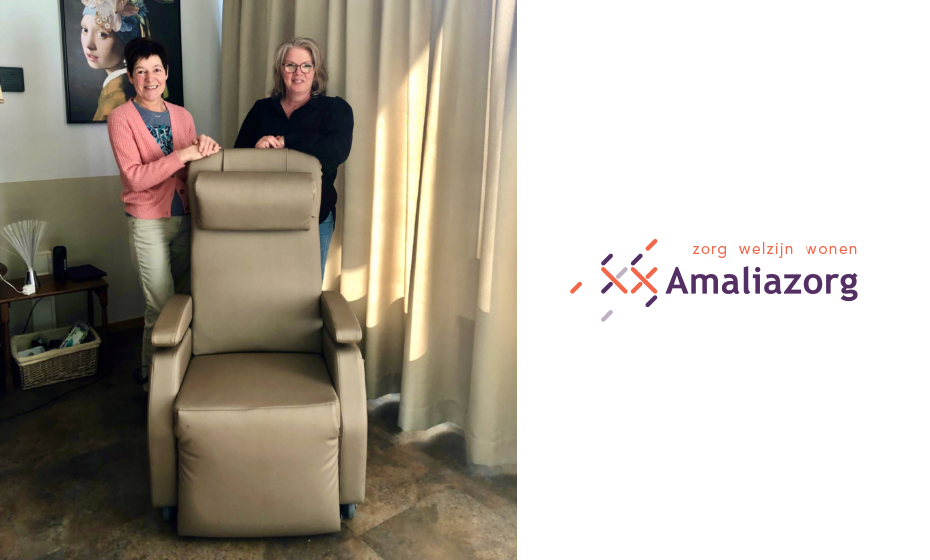 |
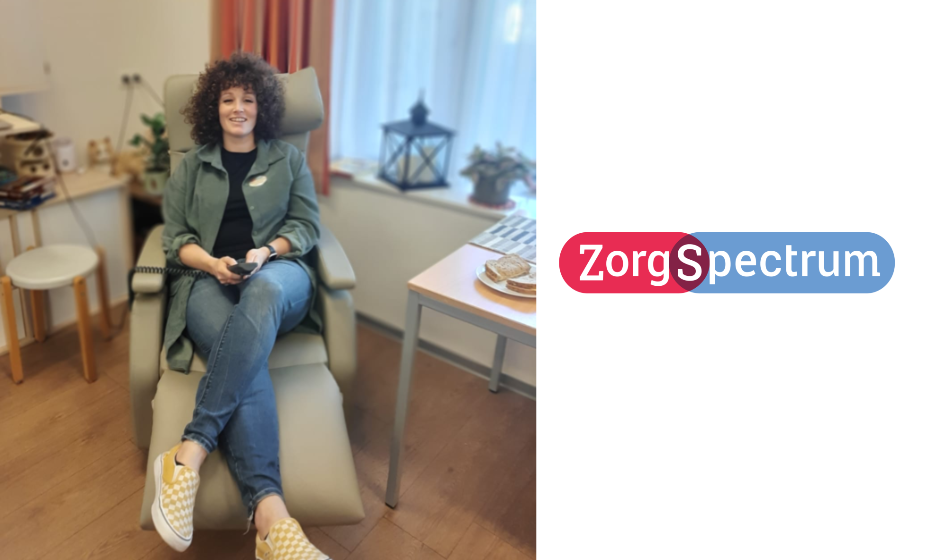 | The story of ZorgSpectrumOccupational therapist Patricia van Rooijen works at ZorgSpectrum (Utrecht region). Here, she is involved in caring for people with dementia at several locations. She also visits people who are still living at home. Patricia is also active - from her field of occupational therapy - within ZorgSpectrum in a project group that studies and implements new care technology. Following a successful trial placement, ZorgSpectrum purchased three ZEN Care chairs. Patricia is keen to share the positive experiences. For example, about a resident with a lot of urge to walk who could not settle down. Until she started rocking in the ZEN Care Chair. Read her story: "We hadn't seen this lady so calm for a long time".
"We hadn't seen this lady so calm for a long time"Occupational therapist Patricia van Rooijen about the effect of the ZEN Care Chair.
As an occupational therapist, what do you do in the field of dementia? "Within psychogeriatrics, as occupational therapists we mainly look at tools that can reduce restlessness. We try to identify where the restlessness comes from, what interventions are possible and what someone can and cannot do independently. In cases of severe dementia, we mainly consult the family. As the care intensity of clients increases, agitation in dementia is becoming more common. Due to staff shortages, it is often no longer possible to do a separate activity with someone experiencing agitation. Therefore, we try to find other tools to cope with agitation." How did you come across the ZEN Care Chair? "A client with severe dementia was very restless. She walked back and forth all day, couldn't find rest anywhere. From my role as care technology ambassador, I have a lot of contact with a care equipment supplier. Our contact told us about the new ZEN Care chair and then I thought: I would like to test it on this client. The care equipment supplier then arranged a trial placement." What effect did the ZEN Care Chair have? "When this lady first sat down in the chair and the rocking started, she fell asleep within a minute. We hadn't seen her so calm for a long time. What we also noticed after a while was that the effect went beyond more calm during the day. It worked through to the evening, something we hadn't expected. This lady was never keen to go to bed, which evoked a lot of resistance in her. This changed when she used the ZEN Care Chair during the day. She would usually rock in it late morning and late afternoon. This made her so calm that she was no longer overstimulated in the evening. As a result, she went to bed calmly and fell asleep better. That was really nice to see.” How did this help caregivers? "This lady was always looking for peace and security before, but couldn't find it. We saw that this made her sad and, out of a kind of desperation, drew a lot of attention from the caregivers. In the small-scale residential facility, this also affected fellow residents; they became irritated. When rocking in the ZEN Care Chair calmed her down, we as caregivers were very happy. Finally we had something that really worked to reduce the restlessness. Our resident felt more comfortable and what's more, it had a positive effect on the atmosphere in the group." What happened after the trial placement? "Due to the positive experience, a ZEN Care Chair was purchased for this residential facility. In addition, I shared our experience with other occupational therapists. A colleague at another location then also requested a trial placement. They liked it there too and so a second chair was purchased. Our organisation now has three ZEN Care chairs that we deploy specifically for people with severe dementia. For funding, we have so far been able to use local funds. I expect there will be more requests for these chairs. We will see if that is possible through funding within our care organisation." |

